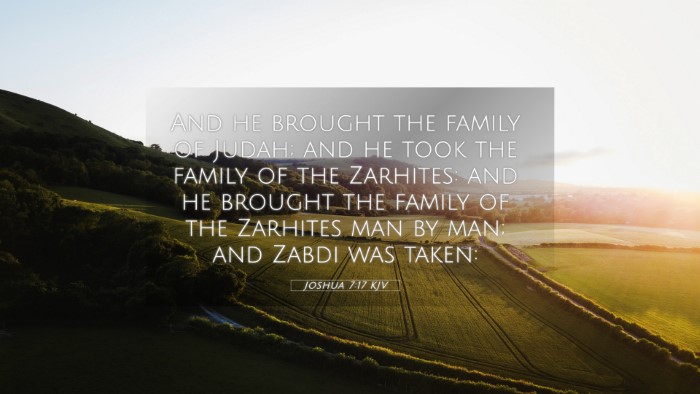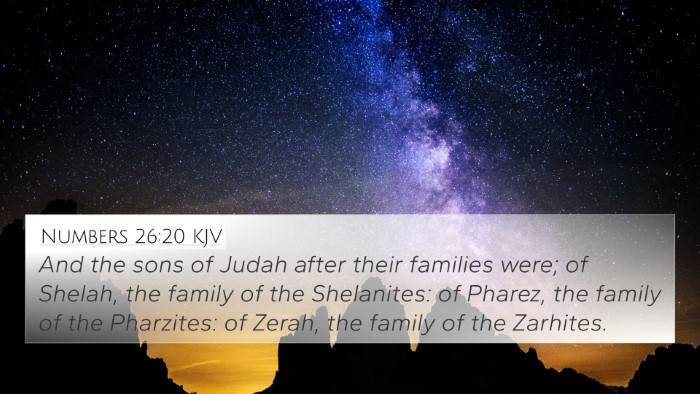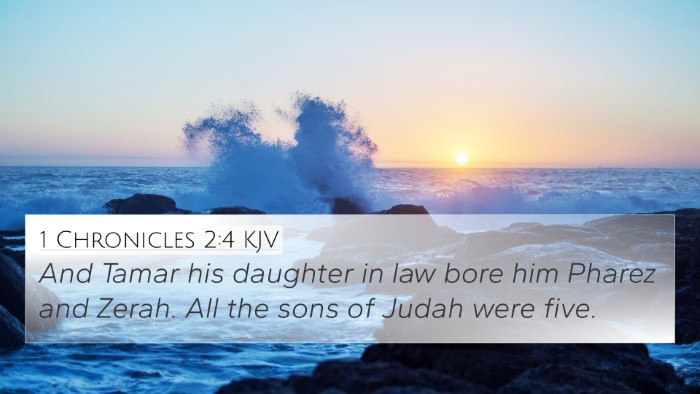Bible Verse Meaning and Interpretation of Joshua 7:17
Joshua 7:17 states: "And he brought the family of Judah; and he took the family of the Zarahites; and he brought the family of the Zarahites man by man; and Zabdi was taken."
This pivotal moment occurs after the Israelite defeat at Ai, stemming from Achan's hidden sin. The verse emphasizes the seriousness of sin and its communal consequences, as the lot was cast to identify the guilty party.
Summarized Insights from Public Domain Commentaries
-
Matthew Henry:
Henry discusses the process of selection through the casting of lots, illustrating God’s sovereignty in revealing Achan’s guilt. The verse highlights that God's methods often involve drawn-out processes that serve to teach the Israelites about holiness and obedience.
-
Albert Barnes:
Barnes elaborates on the significance of the tribe of Judah and the Zarahites being selected in this divine inquiry. He notes that this was more than mere chance; it was God’s way of exposing hidden sin, showcasing the importance of accountability in the community.
-
Adam Clarke:
Clarke focuses on the specifics of the selection process, explaining how God's justice requires a thorough investigation. The taking of families into account reinforces that sin is not only personal but can affect entire communities, echoing the principle that the individual sin can have widespread ramifications.
Bible Cross-References for Joshua 7:17
Several Bible verses relate to Joshua 7:17, illustrating themes of sin, accountability, and community judgment:
- Numbers 32:23: "…but if ye will not do so, behold, ye have sinned against the Lord; and be sure your sin will find you out." – This underscores the certainty of divine judgment.
- Galatians 6:7: "Be not deceived; God is not mocked: for whatsoever a man soweth, that shall he also reap." – A reflection on accountability for actions.
- Hebrews 12:15: "Looking diligently lest any man fail of the grace of God; lest any root of bitterness springing up trouble you, and thereby many be defiled." – The communal nature of sin and its effects.
- Psalm 9:16: "The Lord is known by the judgment which He executeth: the wicked is snared in the work of his own hands." – God’s justice is portrayed as inescapable.
- 1 Corinthians 5:6: "Your glorying is not good. Know ye not that a little leaven leaveneth the whole lump?" – Illustrates how one individual's sin can impact the entire community.
- Acts 5:1-11: The story of Ananias and Sapphira serves as a New Testament parallel demonstrating God’s judgment on hidden sin within the church community.
- Proverbs 28:13: "He that covereth his sins shall not prosper: but whoso confesseth and forsaketh them shall have mercy." – Emphasizes the importance of confession over secrecy in relation to sin.
Thematic Connections Between Bible Verses
This verse and its related passages organize into broader themes of accountability, divine justice, and communal impacts of individual actions. Here’s an exploration:
- Links to Accountability: Drawing connections from Joshua 7:17 to verses like Galatians 6:7 emphasizes the principle of facing the consequences of one’s actions.
- Judgment and Justice: The divine nature of God’s judgment as seen in Numbers 32:23 complements Clarke's understanding of communal sin and exposes how hidden iniquities come to light.
- Sin and its Impact: The leaven analogy in 1 Corinthians 5:6 connects with Joshua 7:17 to illustrate that the effects of sin go beyond the individual to affect the whole community.
Understanding Sin and Community Responsibility
In studying Joshua 7:17 and its cross-references, it is essential to recognize how the Bible emphasizes communal responsibility in the face of sin:
- The Role of the Community: As seen in Joshua 7 and echoed in New Testament teachings, the community must remain vigilant against hidden sin to protect the collective integrity.
- Consequences of Sin: Achan's sin serves as a warning; accountability is not just personal but can lead to corporate punishment or consequence.
- God’s Justice: Every sin has repercussions, and God’s justice serves as the thread that interweaves these scriptures highlighting the nature of divine oversight.
Conclusion
Joshua 7:17 serves as a crucial reminder of the weight of sin, the necessity of community accountability, and the assurance that God will reveal wrongdoings. By examining this verse alongside its related passages, we gain deeper insight into the nature of God’s commands and the dynamics of communal holiness.
Utilizing tools for Bible cross-referencing like concordances and cross-reference guides can enhance our understanding of the complex interrelations of Biblical texts and how they discuss themes such as sin, justice, and community.
Through the practice of cross-referencing and thematic Bible verse connections, we gain a more profound understanding of Scripture, encouraging a mature faith response to God’s revelations and expectations.





